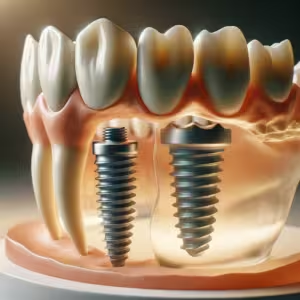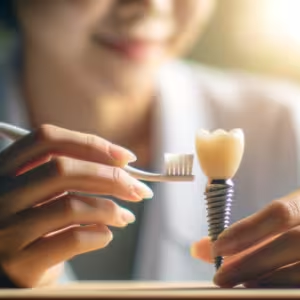Understanding Dental Implants for Adults
Understanding Dental Implants for Adults: A Comprehensive Guide
What are Dental Implants?
Dental implants are artificial tooth roots made of biocompatible materials that are surgically placed into the jawbone to support replacement teeth or bridges. They are designed to function like natural teeth, providing a stable foundation for fixed or removable dental prosthetics. Dental implants can replace a single tooth, multiple teeth, or even an entire arch, making them a versatile solution for tooth loss.
Purpose of Dental Implants
The primary purpose of dental implants is to restore the function and aesthetics of missing teeth. They serve several key roles, including:
- Restoration of Function: Implants allow individuals to chew and speak normally, restoring the functionality of the mouth.
- Preventing Bone Loss: When a tooth is lost, the jawbone beneath it can deteriorate over time. Implants stimulate the bone, helping to maintain its density and structure.
- Aesthetic Improvement: Implants provide a natural-looking solution that enhances the smile and boosts self-confidence.
- Durability and Stability: Unlike dentures, which can shift or loosen, implants are securely anchored in the jaw, offering long-term stability.
Benefits of Dental Implants for Adults
- Natural Appearance: Dental implants are designed to look, feel, and function like natural teeth. They can be customized to match the surrounding teeth for seamless integration.
- Improved Oral Health: Implants help maintain the integrity of the jawbone and do not alter the adjacent teeth, preserving overall oral health.
- Convenience: Unlike removable dentures, implants eliminate the need for messy adhesives and can be cared for just like natural teeth.
- Longevity: With proper care, dental implants can last a lifetime, making them a cost-effective solution in the long run.
- Enhanced Quality of Life: With restored function and appearance, individuals often experience improved self-esteem and a greater quality of life.
The Process of Dental Implant Placement
The dental implant process typically involves several steps, which may vary based on individual needs and the specific case.
- Initial Consultation: The process begins with a thorough examination, including X-rays and 3D imaging, to assess the bone structure and plan the treatment.
- Implant Placement: Under local anesthesia, the dentist surgically places the titanium implant into the jawbone. The procedure usually takes about one to two hours. After placement, osseointegration occurs, during which the bone grows around the implant, securing it in place. This process can take several months.
- Abutment Placement: Once osseointegration is complete, a minor surgery is performed to attach an abutment (a connector) to the implant. This will hold the crown.
- Crown Fabrication: After the gums heal around the abutment, impressions of the mouth are taken to create a custom crown that matches the surrounding teeth in color and shape.
- Final Placement: The crown is securely attached to the abutment, completing the implant process.
Materials Involved in Dental Implants
Dental implants are primarily made from two materials:
- Titanium: The most common material used for the implant post. Titanium is renowned for its strength, lightweight nature, and biocompatibility. Its ability to fuse with bone tissue (osseointegration) makes it an ideal choice for dental implants.
- Ceramics: Often used for the crown, ceramics can provide an aesthetic appearance that closely resembles natural teeth. Materials like zirconia are also popular for their strength and biocompatibility.
Additional components include:
- Abutments: Typically made of titanium or ceramics, these components connect the implant to the crown.
- Crown: Made from porcelain or a similar material, the crown is designed to mimic the appearance of natural teeth.
Dental implants represent a significant advancement in restorative dentistry, offering a reliable solution for tooth replacement that enhances the overall oral health and quality of life for adults. Through a carefully orchestrated process and the use of high-quality materials, dental implants provide a durable, functional, and aesthetically pleasing option for those facing tooth loss.
The Dental Implant Procedure
The Process of Dental Implant Placement
The dental implant process typically involves several steps, which may vary based on individual needs and the specific case.
- Initial Consultation and Examination:
The journey begins with an initial consultation at a dental clinic in Ashburn, VA, where your dentist will conduct a comprehensive examination of your oral health. This may include digital X-rays and 3D imaging to evaluate the jawbone structure. During this appointment, you will discuss your medical history, any existing dental issues, and your expectations for the implants. The dentist will assess whether you have adequate bone density for implant placement or if any preparatory procedures, like bone grafting, are required before proceeding. - Treatment Planning:
After the examination, your dentist will create a personalized treatment plan tailored to your specific needs. This plan outlines the type and number of implants required, the timeline for the procedure, and any additional treatments, such as sinus lifts or bone augmentation, if necessary. In Ashburn, several dental practices may use advanced technology, such as computer-guided implant placement, which enhances precision and outcomes. - Implant Placement Surgery:
The implant placement is typically performed as an outpatient procedure under local anesthesia or sedation. The dentist will make a small incision in the gum tissue to expose the jawbone. A titanium implant post is then surgically inserted into the bone. This procedure usually takes about one to two hours, depending on the number of implants being placed. After placement, the site is sutured, and you will begin the healing phase. This healing period, known as osseointegration, can take several months, during which the bone grows around the implant, securing it in place. - Post-Operative Care:
Following the surgery, specific post-operative instructions will be provided to facilitate recovery. This may include recommendations on pain management, dietary restrictions, and oral hygiene practices. In Ashburn, VA, dentists often provide follow-up appointments to monitor healing and ensure there are no complications, such as infection or excessive swelling. - Abutment Placement:
Once osseointegration is complete, a minor surgical procedure is performed to attach the abutment to the implant. The abutment acts as a connector between the implant and the final crown. This procedure is generally quick and is usually done under local anesthesia. After the abutment placement, the gums will need to heal for a few weeks before proceeding to the next step. - Crown Fabrication:
With the abutment in place, the dentist will take impressions of your mouth to create a custom crown. This crown will be designed to match the color, size, and shape of your natural teeth, ensuring a seamless integration with your smile. In many practices in Ashburn, modern CAD/CAM technology may be utilized to fabricate the crown in-house, reducing the waiting time. - Final Placement of the Crown:
Once the crown is ready, you will return to the dental office for the final placement. The dentist will carefully attach the crown to the abutment, securing it in place. They will check the fit and bite to ensure functionality and comfort. After the final adjustments, you will be provided with care instructions to maintain your new implant and crown. - Recovery and Aftercare:
After the crown is placed, some sensitivity may occur, but most patients can return to their normal activities shortly after the procedure. In Ashburn, VA, dental offices typically emphasize the importance of regular dental check-ups and diligent oral hygiene practices to ensure the longevity of the implants. Long-term care may include regular professional cleanings and monitoring by your dental team to maintain optimal oral health.
By following these steps, residents in Ashburn, VA, can expect a well-structured and supportive approach to obtaining dental implants, designed to restore both function and aesthetics effectively.
Choosing the Right Implant Type
Choosing the Right Implant Type: A Comprehensive Guide
Types of Dental Implants
When considering dental implants, it is crucial to understand the various types available, each catering to different patient needs and conditions. The two primary types of implants are endosteal and subperiosteal implants.
- Endosteal Implants:
Endosteal implants are the most commonly used type of dental implant. They are surgically placed directly into the jawbone and typically resemble small screws or cylinders. This type is made from materials such as titanium, which promotes osseointegration – the process where the bone grows around the implant, securing it in place.
Suitability:
Endosteal implants are ideal for patients who have adequate jawbone density and height. Individuals with strong bone structure can benefit significantly from this type, as it allows for better stability and longevity of the implant. This option is often recommended for patients in Ashburn, VA, who require a single tooth replacement or multiple implants. - Subperiosteal Implants:
Subperiosteal implants are placed under the gum but above the jawbone. This type consists of a metal framework that is fitted onto the bone and acts as a support for the artificial teeth. Unlike endosteal implants, they do not require as much bone density since they are placed under the gum tissue.
Suitability:
Subperiosteal implants are suitable for patients who do not have enough jawbone for an endosteal implant and prefer to avoid bone grafting. This situation might arise in individuals with significant bone loss due to periodontal disease or long-term tooth loss. Patients in Ashburn with such conditions may find this option more viable.
Factors to Consider When Choosing an Implant Type
Selecting the appropriate type of dental implant involves various considerations, particularly focused on individual dental health and lifestyle:
- Bone Density and Health:
A thorough evaluation of the jawbone’s density is crucial. Endosteal implants require sufficient bone to support the implant; if the bone is too thin or weak, bone grafting may be necessary. Conversely, subperiosteal implants can be a better option if bone density is compromised. - Overall Dental Health:
The condition of the gums and surrounding teeth plays a vital role in determining the type of implant. Patients with active periodontal disease may require treatment before any implant procedure. A healthy oral environment is essential for the success of either implant type. - Patient Preferences and Lifestyle:
Understanding the patient’s preferences regarding the procedure, recovery time, and maintenance is important. Some patients might prefer a quicker solution with subperiosteal implants, while others may be willing to undergo bone grafting for the longevity and stability offered by endosteal implants. - Cost Considerations:
Both types of implants come with different costs, influenced by the complexity of the procedure, any additional treatments required (like bone grafting), and the materials used. Discussing these financial aspects with a dentist can help in making an informed decision. - Long-Term Goals:
Patients should consider their long-term dental health goals. Those seeking a permanent solution with the potential for a longer lifespan may opt for endosteal implants. Subperiosteal implants may serve as a quicker fix but could necessitate future dental work.
Personalized Consultation
It is recommended that patients in Ashburn, VA, seeking dental implants engage in a comprehensive consultation with a qualified dental professional. This consult should include diagnostic imaging to assess bone structure and a detailed discussion of options. Each patient’s unique dental health will guide the selection of the most suitable implant type, ensuring the best possible outcomes in function, aesthetics, and longevity.
Costs and Insurance Coverage
Costs and Insurance Coverage of Dental Implants
Understanding the financial implications of dental implants is crucial for patients considering this restorative dental procedure. The costs associated with dental implants can vary significantly based on several factors, and insurance coverage can differ widely among providers. This section aims to offer guidance specifically tailored for patients in Ashburn, VA, to help them navigate the financial landscape of dental implants.
Breakdown of Costs
The total cost of dental implants typically encompasses a variety of components, which may include:
- Consultation Fees: The initial consultation may involve diagnostic imaging (X-rays or 3D scans) and a comprehensive examination. These fees can range from $100 to $500, depending on the complexity of the assessment.
- Implant Placement: The actual surgical procedure to place the implant post can vary depending on the dentist’s experience, the complexity of the case, and the geographical location. In Ashburn, VA, costs for implant placement generally range from $1,000 to $3,000 per implant.
- Abutment and Crown: After the implant has integrated with the bone, an abutment is attached to connect the implant to the crown. The cost for the abutment can range from $300 to $600, while the custom crown can cost an additional $800 to $3,000, depending on the materials used. Porcelain crowns are typically more expensive than resin or metal options.
- Additional Procedures: Some patients may require additional procedures, such as bone grafting or sinus lifts, if they do not have enough bone density to support the implant. These procedures can add anywhere from $300 to $3,000 to the overall cost.
- Follow-Up Care: Post-operative visits and maintenance can add to the overall cost. Regular dental check-ups and cleanings are essential to ensure the longevity of the implants.
Factors Influencing Pricing
Several factors can influence the overall cost of dental implants:
- Type of Implant: There are variations in implant types, including traditional implants, mini implants, and implant-supported dentures. The choice of implant can affect the final price.
- Geographic Location: The cost of dental care can vary significantly between regions. Urban areas like Ashburn, VA, may have higher rates compared to rural locations due to factors such as demand and cost of living.
- Dentist’s Expertise: The experience and reputation of the dental professional performing the procedure can influence costs. Highly skilled specialists may charge more for their services.
- Materials Used: The type of materials used for the implant, abutment, and crown can also impact the overall price. Higher-quality materials may result in increased costs.
Insurance Coverage
Navigating insurance coverage for dental implants can be complex, as many insurance policies traditionally categorize implants as a cosmetic procedure. However, patients in Ashburn, VA, may find varying levels of coverage depending on their specific insurance plan. Here are some key points to consider:
- In-Network vs. Out-of-Network Providers: Choosing a dentist who is in-network with your insurance provider can often reduce out-of-pocket costs. Always verify which dentists are covered under your plan.
- Coverage Limits: Some insurance policies may cover a portion of the costs associated with dental implants, while others may have limits on coverage. Patients should review their policy documents or contact their insurance provider to understand their specific coverage.
- Payment Plans and Financing Options: Many dental practices offer payment plans or financing options to help patients manage the costs of dental implants. These plans can allow patients to pay in installments, making the procedure more financially accessible.
- Flexible Spending Accounts (FSAs) and Health Savings Accounts (HSAs): Patients may be able to use funds from FSAs or HSAs to cover dental implant costs. These accounts allow individuals to set aside pre-tax dollars for medical expenses.
- Pre-Authorization: Some insurance companies require pre-authorization for dental implant procedures. Patients should check with their insurer before proceeding to ensure they understand what will be covered.
Navigational Guidance for Patients in Ashburn, VA
- Get Multiple Estimates: Consult with multiple dental professionals to obtain cost estimates for the entire implant process, including any ancillary procedures required.
- Review Insurance Policy Details: Take the time to thoroughly review your insurance policy, specifically focusing on any exclusions or limitations related to dental implants.
- Discuss Financial Options with Your Dentist: Inquire about payment plans, financing options, and the potential for using FSAs or HSAs to help manage costs.
- Keep Track of Receipts: Maintain accurate records of all dental expenses, as these may be necessary for tax purposes or insurance reimbursement.
- Consider Long-Term Value: Although the initial costs of dental implants may be significant, consider the long-term benefits and potential savings in dental health that implants can provide over time.
Post-Procedure Care and Maintenance
Post-Procedure Care and Maintenance: A Comprehensive Guide
Immediate Post-Operative Care
After the dental implant surgery, it is crucial to follow specific care instructions to promote healing and minimize discomfort. Key practices include:
- Managing Discomfort: Some swelling, bruising, or pain is common post-surgery. Over-the-counter pain relievers, as recommended by your dentist, can help manage any discomfort. It’s advisable to apply ice packs to the outside of your face for the first 48 hours to reduce swelling.
- Dietary Adjustments: In the initial days following surgery, opt for soft foods that require minimal chewing, such as yogurt, mashed potatoes, smoothies, and soups. Avoid hard, crunchy, or sticky foods that could irritate the surgical site.
- Rest and Recovery: Ensure you get plenty of rest to aid the healing process. Avoid strenuous activities for the first few days post-surgery, as this can increase blood flow and potentially disrupt the healing process.
Oral Hygiene Practices
Maintaining excellent oral hygiene is essential for the longevity and success of dental implants, particularly for residents in Ashburn, VA, where access to quality dental care and products is readily available. Recommended practices include:
- Gentle Brushing: After 24 hours, resume brushing your teeth, but be gentle around the implant site. Use a soft-bristled toothbrush and non-abrasive toothpaste to avoid irritation.
- Rinsing: After 48 hours, begin rinsing your mouth with a warm saltwater solution (1 teaspoon of salt in 8 ounces of water) several times a day to keep the surgical area clean. This can help reduce the risk of infection.
- Flossing: Flossing is crucial, but avoid the implant site during the first week. Once you receive clearance from your dentist, use a floss threader or interdental brushes designed for dental implants to clean around the implant and abutment gently.
- Avoiding Tobacco Products: If you smoke or use tobacco, consider abstaining during the healing period. Tobacco can impede healing and increase the risk of implant failure.
Follow-Up Appointments
Regular follow-up appointments with your dentist are vital for monitoring the healing process and the integration of the implant into the bone. Typically, follow-up visits may include:
- Initial Follow-Up: A visit approximately one week after surgery to remove stitches, if necessary, and assess the healing process.
- Periodic Check-Ups: Scheduled visits every few months during the first year to ensure that the implant site is healing properly and that no complications are arising.
- Long-Term Maintenance: After the first year, annual check-ups are crucial to maintain the health of your implants and overall oral hygiene. X-rays may be taken to evaluate the bone surrounding the implant.
Importance of Proper Care
Proper care and maintenance of dental implants are essential to ensure their longevity and effectiveness. Neglecting oral hygiene can lead to peri-implantitis, an inflammatory condition that can result in the loss of the implant. For residents in Ashburn, VA, maintaining regular dental visits not only helps monitor the success of your implants but also contributes to overall oral health in a community where preventative care is emphasized.
Investing time in proper care after your dental implant surgery can yield significant benefits, including the preservation of bone density, prevention of infection, and the maximization of your implant’s lifespan. With diligent attention to oral hygiene and regular dental check-ups, dental implants can serve you well for many years, enhancing both function and aesthetics in your smile.
Success Rates and Complications
Success Rates and Complications of Dental Implants
Success Rates for Dental Implants
Dental implants boast impressive success rates, generally exceeding 95% in adults. This high level of success can be attributed to advancements in technology and techniques in dental surgery. In Ashburn, VA, local dental practices often report similar outcomes, with factors such as the patient’s overall health, the quality of the bone, and adherence to post-operative care playing critical roles in determining success.
Long-term studies indicate that success rates remain high over several years, with many implants lasting a lifetime when properly cared for. Regular dental check-ups and good oral hygiene practices are essential in maintaining the integrity of the implants and ensuring their longevity.
Potential Complications
While dental implants are highly successful, potential complications can arise. Understanding these risks is crucial for informed decision-making. Here are some common complications to be aware of:
- Infection at the Implant Site: Post-surgical infection can occur, leading to inflammation and potential implant failure. Symptoms may include swelling, pain, and discharge at the surgical site.
- Nerve Damage: Improper placement of the implant may lead to nerve damage, causing sensations like tingling, numbness, or pain in the gums, lips, or chin.
- Sinus Problems: For upper jaw implants, if the implant protrudes into the sinus cavity, it can lead to sinus infections and other complications.
- Implant Failure: Although rare, implants can fail to integrate with the jawbone due to inadequate bone density, infection, or excessive stress on the implant.
- Peri-implantitis: This inflammatory condition surrounding the implant can lead to bone loss and implant failure if not addressed promptly. Symptoms may include swelling, pain, and pocket formation around the implant.
- Aesthetic Issues: In some cases, the crown may not match the surrounding teeth in color or shape, leading to aesthetic dissatisfaction.
Factors Affecting Success Rates
Certain factors can influence the success rates of dental implants in adults:
- Bone Density: Patients with sufficient bone density are more likely to experience successful integration of the implant. If bone density is insufficient, bone grafting may be necessary to provide adequate support.
- Patient Health: Conditions such as diabetes or autoimmune diseases can affect healing and increase the risk of complications. It’s important for patients to disclose their medical history to their dental provider.
- Lifestyle Habits: Smoking and poor oral hygiene can negatively impact the success of dental implants. Smoking impairs blood flow and healing, while inadequate oral care can lead to infections.
Preventative Measures to Enhance Success
To maximize the success rates of dental implants, patients can take several preventative measures:
- Pre-Operative Assessment: A thorough evaluation by a dental professional can help identify any underlying issues that may affect implant placement.
- Bone Grafting: If necessary, bone grafting can augment the jawbone before implant placement, ensuring a stable foundation for the implant.
- Adherence to Oral Hygiene: Maintaining excellent oral hygiene, including regular brushing, flossing, and dental check-ups, can help prevent infections and complications.
- Avoiding Tobacco Products: Quitting smoking or avoiding tobacco products can significantly improve healing and reduce the risk of implant failure.
- Managing Health Conditions: Properly managing chronic health issues, including diabetes and heart disease, can enhance healing and reduce complications.
- Follow-Up Care: Regular follow-up visits with the dental professional can ensure that any potential issues are addressed promptly.
Conclusion
Dental implants offer a successful and durable solution for restoring missing teeth, with impressive success rates for adults in Ashburn, VA. However, potential complications must be recognized and addressed through careful planning and postoperative care. By understanding the factors influencing success rates and taking preventative measures, patients can enhance their chances of a positive outcome. Through diligent care and informed decision-making, individuals can achieve lasting benefits from their dental implants, significantly improving their quality of life.






